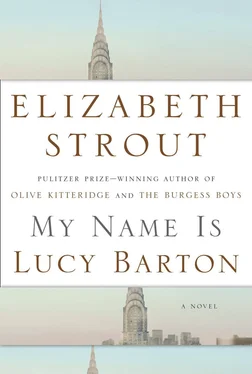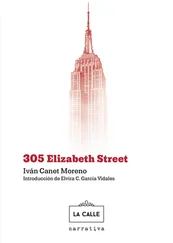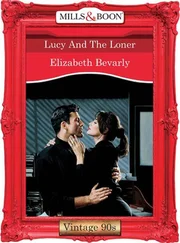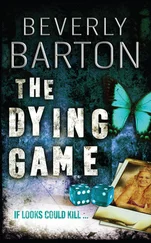I saw my mother only one time after she came to see me in the hospital. It was almost nine years later. Why didn’t I go there to visit her? To visit my father, and my brother and sister? To see the nieces and nephews I had never seen? I think — to say it simply — it was easier not to go. My husband would not come with me, and I didn’t blame him. And — I know the defensiveness in this sentence — my parents and my sister and my brother never wrote me, or called me, and when I called them it was always hard; I felt I heard in their voices anger, a habitual resentment, as though they were silently saying You are not one of us, as though I had betrayed them by leaving them. I suppose I had. My children were growing, they needed something all the time. My two or three hours a day in which to write were terribly important to me. And then my first book was being readied to publish.
—
But my mother became ill, and so I was the one, then, who went to her hospital room in Chicago, to sit at the foot of her bed. I wanted to give her what she had given me, the kind of wide-awake constancy of attentiveness of those days she had been with me.
My father greeted me when I stepped off the elevator in the hospital, and I would not have known who he was except for the gratitude I saw in the eyes of this stranger, that I had come to help him. He looked so much older than I had ever thought he could be, and any anger I felt — or that he felt — did not seem connected to us anymore. The disgust I had had for him most of my life was not there. He was an old man in a hospital who had a wife who was going to die. “Daddy,” I said, staring at him. He wore a wrinkled collared shirt and jeans. I think he was too shy at first to hug me, so I hugged him, and imagined the warmth of his hand against the back of my head. But in the hospital, that day, he did not, in fact, put his hand across the back of my head, and something inside me — deep, deep inside — heard the whisper Gone.
My mother was in pain; she was going to die. This was not something I seemed able to believe. My children were by then teenagers and I was worried especially about Chrissie, whether she was smoking too much weed. So I was on the phone to them frequently, and the second evening as I sat near my mother she said to me quietly, “Lucy, I need you to do something.”
I stood and went to her. “Yes,” I said. “Tell me.”
“I need you to leave.” She said this quietly, and I heard no anger in her voice. I heard her decisiveness. But truly, I felt panic.
I wanted to say: If I leave, I will never see you again. Things have been hard with us, but don’t make me leave, I can’t bear to never see you again!
I said, “Okay, Mom. Okay. Tomorrow?”
She looked at me, and tears pooled in her eyes. Her lips twitched. She whispered, “Now, please. Honey, please.”
“Oh, Mommy—”
She whispered, “Wizzle, please.”
“I’ll miss you,” I said, but I was starting to cry, and I knew she could not stand that, and I heard her say, “Yes, you will.”
I bent and kissed her hair, which was matted from her being sick and in bed. And then I turned and took my things, and I did not look back, but when I stepped through the door, I could not keep walking. I backed up without turning around. “Mommy, I love you!” I called out. I was facing the hallway, but her bed was the closest to me, and she would have heard me, I am sure. I waited. There was no answer, no sound. I tell myself she heard me. I tell myself — I’ve told myself — this many times.
Immediately I went to the nurses’ station. I said, begging, Please don’t let her suffer, and they told me they would not let her suffer. I didn’t believe them. There had been the woman in the room dying when I was first having my appendix out, and that woman had been suffering. Please, I begged these nurses, and I saw in their eyes the deepest fatigue of people who cannot do any more about anything.
In the waiting room was my father, and when he saw my tears he shook his head quickly. I sat by him and whispered what my mother had said, that she needed me to leave. “When will the service be?” I asked. “Oh, please, tell me when it is, Daddy, I will come right back.”
He said there would be no service.
I understood. I felt I understood. “People would come, though,” I said. “She’s had those sewing customers, and people would come.”
My father shook his head. No service, he said.
And there was no service for her.
Or for him, the next year, when he died from pneumonia; he would not let my brother take him to a doctor. I flew to see him only days before he died, staying in the house I had not seen for so many years. It frightened me, the house, its smells and its smallness, and the fact that my father was so ill and my mother gone. Gone! “Daddy,” I said, sitting on the bed by him. “Daddy, oh, Daddy, I’m sorry.” I said that again and again: “Daddy, Daddy, I’m so sorry. I’m sorry, Daddy.” And he squeezed my hand, his eyes were so watery, his skin so thin, and he said, “Lucy, you’ve always been a good girl. What a good girl you’ve always been.” I am quite certain he said this to me. I believe, though I am not sure, that my sister left the room then. My father died that night, or rather very early the next morning, at three o’clock. I was alone with him, and when I heard the sudden silence I stood and looked at him and said, “Daddy, stop it! Stop it, Daddy!”
When I got back to New York after seeing my father — and my mother, the year before — after seeing them for the last time, the world began to look different to me. My husband seemed a stranger, my children in their adolescence seemed indifferent to much of my world. I was really lost. I could not stop feeling panic, as if the Barton family, the five of us — off-kilter as we had been — was a structure over me I had not even known about until it ended. I kept thinking of my brother and my sister and the bewilderment in their faces when my father died. I kept thinking how the five of us had had a really unhealthy family, but I saw then too how our roots were twisted so tenaciously around one another’s hearts. My husband said, “But you didn’t even like them.” And I felt especially frightened after that.
—
My book received good reviews, and suddenly I had to travel. People said, How crazy — such an overnight success! I was on a national morning news show. My publicist said, Act happy. You are what these women who are getting dressed for work want to be, so you get on that show and you act happy. I have always liked that publicist. She had authority. The news show was in New York, and I was not as scared as people assumed I would be. The business of fear is a funny business. I was in my chair, with my microphone attached to my lapel, and I looked out the window and I saw a yellow taxi and I thought, I am in New York, I love New York, I am home. But when I traveled to other cities, as I had to do, I was terrified almost constantly. A hotel room is a lonely place. Oh God it is a lonely place.
—
This was right before email became the common way for people to write one another. And when my book came out I received many letters from people telling me what the book had meant to them. I received a letter from the artist of my youth telling me how much he liked the book. Every letter I received I answered, but I never answered his.
When Chrissie left for college, then Becka the next year, I thought — and it’s not an expression, I’m saying the truth — I did think I would die. Nothing had prepared me for such a thing. And I have found this to be true: Certain women feel like this, that their hearts have been ripped from their chests, and other women find it very freeing to have their children gone. The doctor who makes me not look like my mother, she asked me what I did when my daughters went to college, and I said, “My marriage ended.” I added quickly, “But yours won’t.” She said, “It might. It might.”
Читать дальше












